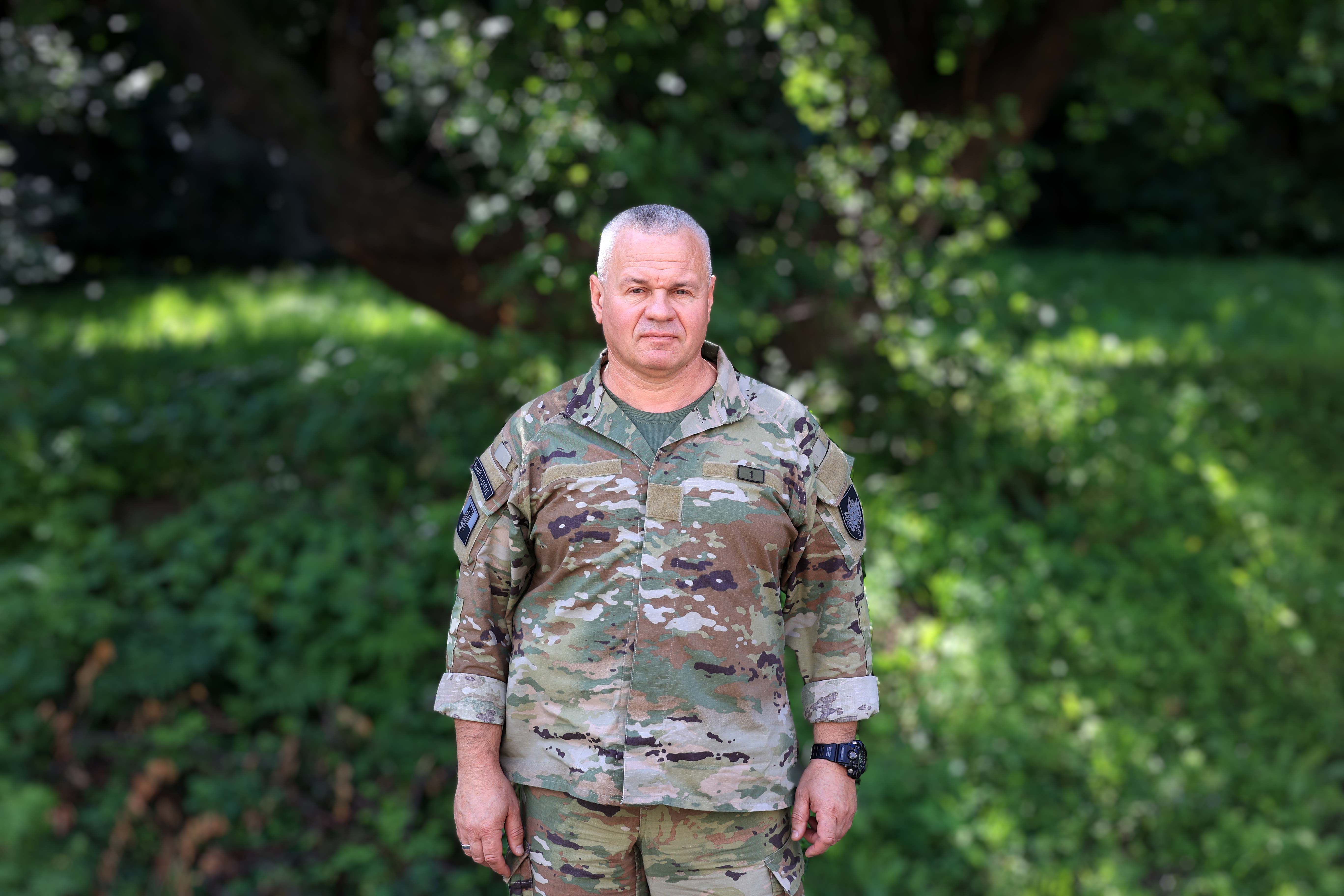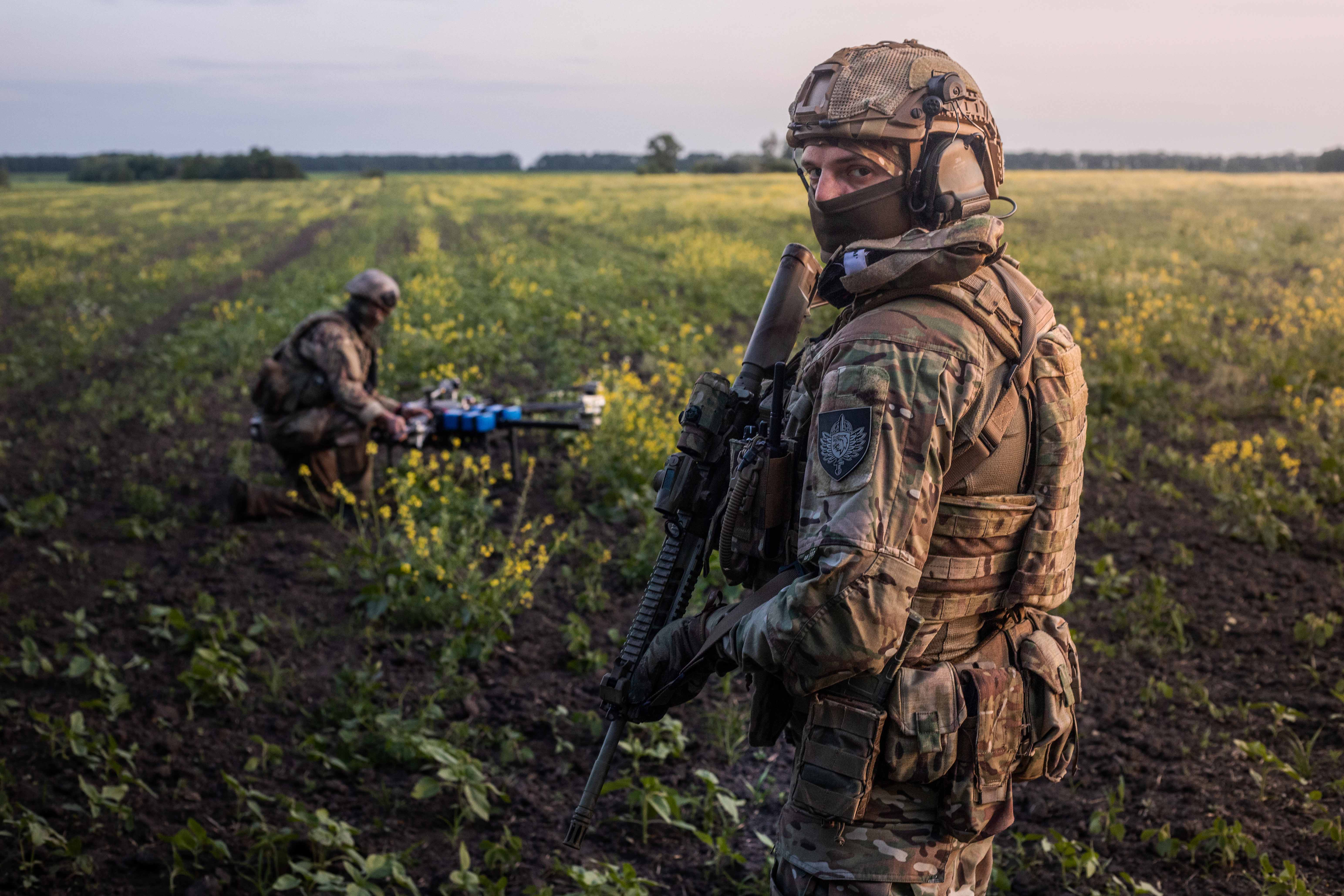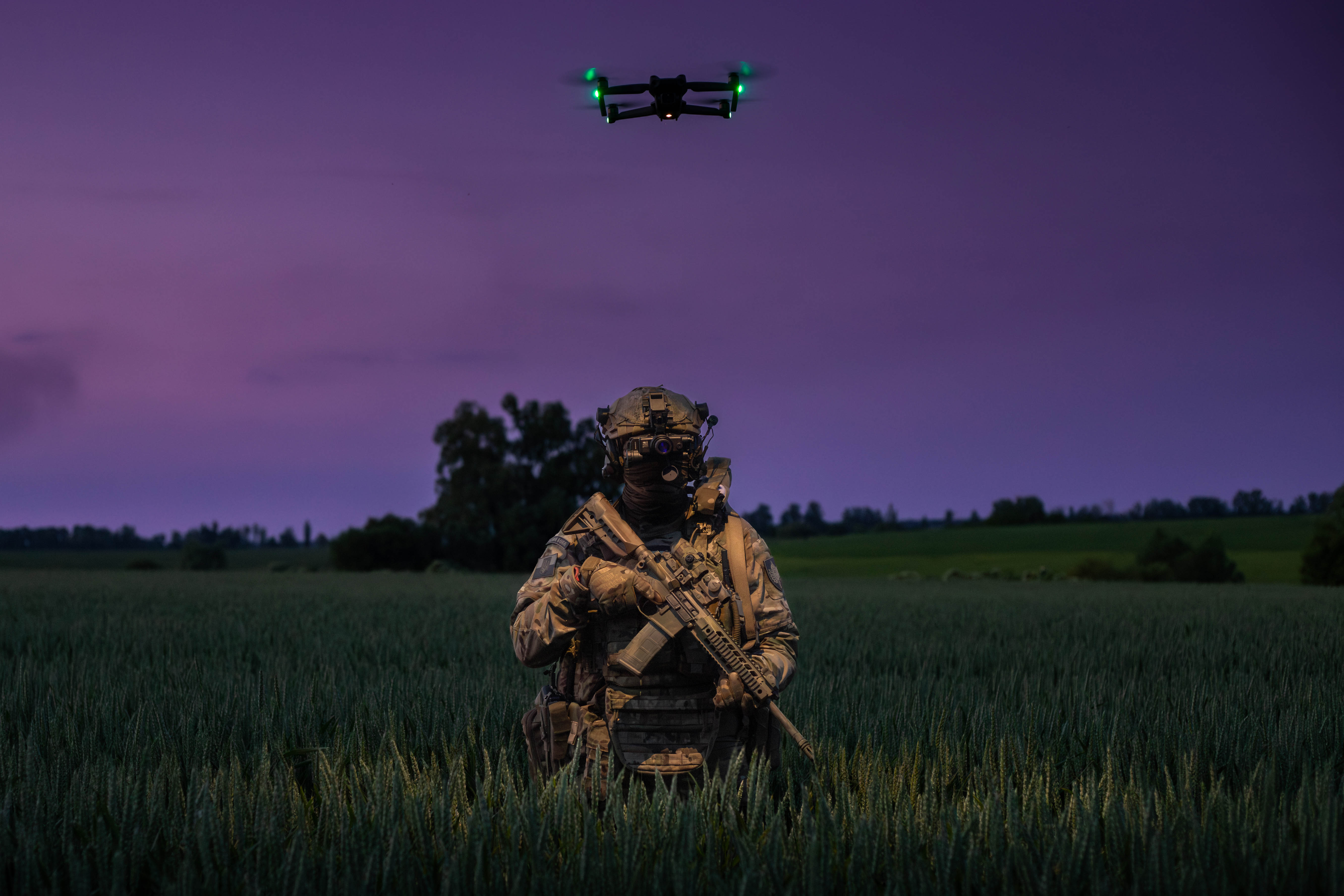Every one in twenty destroyed Russian tanks is down to their work. The story of the Ukrainian Security Service's White Wolf special unit and its commander, Oleh Yemets
The White Wolf special unit of the Alpha Special Group of the Security Service of Ukraine (SSU) celebrated a kind of anniversary in July of this year - 400 units of Russian equipment burned since the beginning of the full-scale war. This figure is even more impressive if you know that this special unit alone accounts for about 5% of all Russian tanks destroyed by Ukrainian troops since the full-scale invasion. On YouTube, you can see numerous videos by the SSU demonstrating the successes of the White Wolf unit.
At the same time, there is very little public information about this special unit and its commander, Senior Lieutenant Oleh Yemets. Ukrainska Pravda is fixing this omission.
Advertisement:Last but one vacancy
To what extent does a person determine their own fate, and to what extent does fate pave the way for them? Kyiv, the second half of the 1990s.
Unemployed Oleh Yemets enters the gates of a furniture factory. He is sure that he is the master of his own destiny. The factory belongs to Valeryi Khoroshkovskyi, not yet an oligarch, not a general, but a man of means who is a year younger than Yemets.
Oleh came to the factory entrance to get a job as a security guard. He has a sick child at home. The flat in which he lives with his family is rented.
Money is still left for food, but it is running out quickly. God only knows, he really needs this job! The security guard job is the last but one option available.
Yemets had applied for several vacancies and even passed an interview at the Verkhovna Rada [Ukraine's parliament] Committee on Ecology. But it didn't work out. He is a biophysicist, a Candidate of Sciences [equivalent to PhD degree - ed.].
Many scientists knew that the distance between the microscope and the scales on the market was very short in the hungry 1990s in the post-Soviet space. Yemets also knew, only for him, it was the distance between a microscope and a gun. There were times when he worked day after day: one day he guarded businessmen, and for the other two, he was writing his dissertation].
But that was in the past. Now the biochemist Yemets has come to the furniture factory to become a security guard. However, it was not to be.
Someone else got the position. So, he had to build a scientific career in the United States instead of taking the position of a security guard in Ukraine. Having lost hope of finding a job in Kyiv, Oleh Yemets succumbed to fate and accepted the last offer - to take up a professorship at the University of Pittsburgh in Pennsylvania.
Many years would pass, and Yemets would walk near that factory one day. But he would feel neither malevolence nor pleasure. "You could say it's fate," he concludes.
His path is a dance of fate and personal choice, where one partner leads, and then another.
 Oleh Yemets: I know what I'm doing; I know why I'm doing it; I know the price I am paying for itPHOTO: YEVHEN RUDENKO
Oleh Yemets: I know what I'm doing; I know why I'm doing it; I know the price I am paying for itPHOTO: YEVHEN RUDENKO
Smell of blood
Oleh Yemets believed in a future attack by Russia on Ukraine back in 2011. As a reminder, Yanukovych ruled the country at the time, the Kharkiv Pact had already been signed, Patriarch Kirill of Moscow visited Ukraine occasionally, and students had been demanding the dismissal of "Ukrainophobe Tabachnyk" from the post of Minister of Education for a year. And the person who had not become Yemets' employer in the 1990s was in charge of the Security Service of Ukraine.
Yemets was already working in Ukraine at that time. He left the Brain Institute in Florida (he was invited there after Pittsburgh) in 2004 and returned to Kyiv on the eve of the Orange Revolution. Oleh felt he had got the most from the States and decided to cure his lingering nostalgia at home.
He founded a company specialising in molecular biology and genetic engineering and plunged into the abyss of Ukrainian business. He names several reasons for his confidence in the inevitability of the future war. The first is that he received information (not classified, but Yemets uses his words carefully when talking about it) about infrastructure works in a certain territory of the Russian Federation.
He was used to working with a large array of data as a scientist, so he could see the wood for the trees in terms of the impending war. He picks up a knife to demonstrate the second reason.
Advertisement:Oleh places the knife on the table's edge, so the handle hangs above the floor and presses the blade against the surface. "It is held only by my finger.
This is an asymmetric state for a knife", he explains. "Similarly, our society got out of balance. Ukraine became like a big fruit that had grown enough to make a predator want to come here. The men of this land stopped showing the appropriate level of aggression to make the men of another land afraid to attack..."
It happens suddenly. The knife slips from under his finger and flies to the floor - a good, army one, the kind that cuts wire or tendons. "There is another reason," Yemets reaches for the knife. "I could literally smell blood ."
After that, it seems superfluous to ask why the wolf became the totem of his unit.
 The White Wolf ("White Wolf") special unit of the Alpha Special Group of the Security Service of Ukraine (SSU) during training PHOTO: SECURITY SERVICE OF UKRAINE
The White Wolf ("White Wolf") special unit of the Alpha Special Group of the Security Service of Ukraine (SSU) during training PHOTO: SECURITY SERVICE OF UKRAINE
It would look like boasting if someone else said now that he had already predicted war back then, in 2011. However, Yemets has proof: that very year he opened the White Wolf Special Tactical Training Centre, and he registered a non-governmental organisation two years later. "It was a community of like-minded people who understood that war was inevitable.
We began to prepare as a unit with unified standards for conducting combat operations. We were equipped in the same way and coordinated regularly according to the programme we had prepared," he recalls. The equipment was bought with their own money.
Group training took place every week. A clear hierarchy was introduced. A kind of combat unit that simply had not yet entered combat.
Yemets draws an analogy with a broken thermometer. Just as balls of mercury connect together quickly, so in White Wolf, people with the same worldview underwent a process of self-assembly. Among them are those who had no military background.
Yemets explains it simply. Many people in uniform became soldiers accidentally. And some civilians are innately military.
They got lost in life, entered the wrong door, and finally found themselves in White Wolf. Fate had been preparing completely different doors for Yemets. His great-grandfather, grandfather and uncle were in the military.
After school, young Oleh was also going to become a soldier after finishing school, he had a natural inclination to serve. But he decided to try the beta version before finally choosing such a programme for his life. And he enlisted for military service for a fixed period to serve in airborne reconnaissance.
"While serving in an elite unit, I quickly realised that this elite was phoney, to a certain extent. Paratroopers break bricks with their heads and show off in other ways, but all this has nothing to do with the performance of combat tasks," Yemets says. "That's why I got involved in completely different things (after demobilisation - UP)."
 Struggling with his destiny, he prevailed that time.PHOTO: SECURITY SERVICE OF UKRAINE
Struggling with his destiny, he prevailed that time.PHOTO: SECURITY SERVICE OF UKRAINE
Longest day in the war
A Ukrainian drone was shot down near one of the mines in the area of Marinka in 2015. The task was to drive an armoured vehicle into the territory controlled by the Russians, reach the mine and retrieve the drone.
An enemy sniper, shooting on the approaches to the mine from a slag heap, was among the most likely threats. There was fire support from their fighters for insurance, which were supposed to "crush" the sniper on the ground. That's how it looked in theory.
Life turned out differently. The group, which included Oleh Yemets, was dropped off at the planned location. It turned out that there was no armoured vehicle.
There was no fire support either. There was a minefield ahead. And there were two bomb disposal experts in the group, called "disposable" behind their backs because of their low level of qualification.
Yemets still doubts the value of that lost drone. But no one cancelled the order, it had to be carried out. And they walked across the mined field "like a bunch of idiots." It was 600 metres to the slag heaps, where the sniper was supposed to be.
They started moving. Suddenly, Yemets heard a shot, 200 metres away - in addition to the sniper on the slag heaps, there was another one somewhere nearby. The weapon had a silencer.
That is why only he and sniper Viktor understood that the group was being shot at. All the others - fighters without experience - did not have the faintest idea. Oleh and Viktor glanced at each other.
To stop meant that the group would be shot dead. They kept silent. They continued to move.
Advertisement:Another shot.
They kept going. It was not clear where they were shooting from. But the distance was getting shorter.
"I can imagine how it looked from the enemy's side. A man is sitting in front of a minefield. A group appears on the field in broad daylight.
He jumps out, starts shooting and misses. And they continue to move, and no one reacts. He shoots again.
Zero reaction. And then he most likely just ran away," Oleh says. Yemets calls this day, when they retrieved the drone and miraculously came out alive, the longest on the front.
When the war in Donbas began, the members of the Centre began not only to train specialists from the Armed Forces of Ukraine and the Ministry of Internal Affairs but also took part in hostilities themselves. The group led by Yemets was given two types of tasks: physical protection of aerial scouts and the recovery of downed reconnaissance equipment from the territory controlled by the enemy. It was during the second type of task that he experienced the longest day of the war.
While working with aerial scouts, in particular with the legendary Volodymyr Chubaka ("Chewbacca") Kochetkov-Sukach, Yemets realised that the war had changed. As a scout, he knew how to move behind the enemy's rear, investigate objects, conduct surveillance, and carry out sabotage. But all this was nothing compared with what one UAV operator could do.